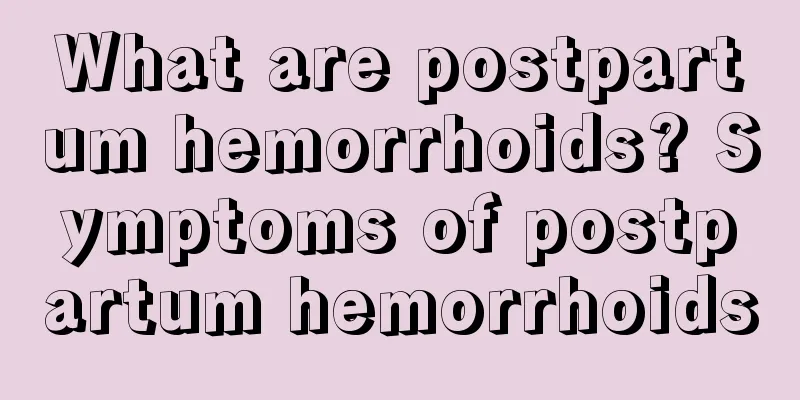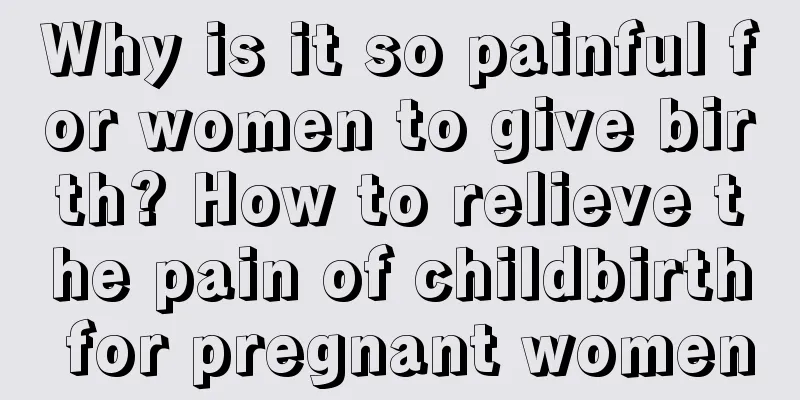What are postpartum hemorrhoids? Symptoms of postpartum hemorrhoids

|
Hemorrhoids are a disease that everyone is familiar with. Both men and women can get hemorrhoids. Hemorrhoids are very uncomfortable, especially when defecating, the pain is unbearable. There are many types of hemorrhoids, and postpartum hemorrhoids are one of them. This is a problem that many women have. What are postpartum hemorrhoids1. The development of the uterus of females during their puberty period affects their rectum, causing it to tilt backwards and increase its curvature. The stool passes more slowly than that of men, which can easily cause constipation and lead to hemorrhoids. 2. During pregnancy, the enlarged fetus compresses the rectum, causing obstruction of venous return to the rectum and anus, causing varicose veins and forming hemorrhoids. 3. During childbirth, it may cause local hemorrhoidal venous reflux obstruction in the anus, causing hemorrhoids, and even causing damage to the hemorrhoidal veins, leading to thrombosed external hemorrhoids and inflammatory external hemorrhoids. 4. After delivery, due to the empty abdominal cavity and slow bowel movement, there is often no bowel movement for several days. In addition, due to long-term bed rest and weak bowel movements, feces stay in the intestines for too long and become highly hardened, which can easily injure the anus and cause illness during defecation. The increase in pelvic pressure due to the enlargement of the uterus cannot be changed, but the aggravation of hemorrhoids can be prevented by avoiding constipation, avoiding standing or sitting for long periods of time, and adjusting diet. After delivery, with the delivery of the fetus, the stomach, small intestine, and large intestine return to their normal positions. Due to the removal of the compression factors, intestinal peristalsis slows down. In addition, after delivery, the pelvic muscles and muscles around the anus are too tight, the perineum wound is painful and the hemorrhoids are painful. The mother dare not force to defecate. After delivery, she often lies down, has less activity, and the abdominal wall is loose. She also eats more food with less residue, which makes constipation more likely to occur, aggravating hemorrhoids. Postpartum hemorrhoids are one of the obstetric emergencies; this is because after pregnancy, as the uterus grows, abdominal pressure increases, especially in the late pregnancy, the inferior vena cava becomes congested and dilated, especially during delivery, uterine contractions gradually increase, and parturients are prone to hemorrhoid incarceration when holding their breath. After hemorrhoid incarceration, the internal hemorrhoids prolapse out of the anus, the sphincter spasms and cannot be reset by itself, and becomes congested and edematous. The prolapsed inner core also stimulates the peripheral nerves around the anus, causing swelling and pain, and in severe cases, ischemic necrosis may occur. Using a Chinese herbal medicine formula that has the functions of clearing away heat and dampness, promoting blood circulation and removing blood stasis, and astringing, fumigating and washing hemorrhoids, improving the blood circulation of local tissues, and adding reasonable dietary therapy and nourishment, postpartum hemorrhoids can often achieve satisfactory results, not only eliminating clinical symptoms, but also ensuring long-term efficacy. Symptoms of postpartum hemorrhoidsIt is very necessary for mothers to know the symptoms of postpartum hemorrhoids. After knowing the symptoms, mothers can check whether there are any abnormalities in their bodies at any time and anywhere, so that they can detect and treat them early. Early treatment can also lead to early recovery. 1. There is blood during bowel movements, with spurting bleeding, spotting, blood on toilet paper, etc. The blood is bright red. 2. A nucleus-like object may come out during defecation and then go back on its own after defecation. 3. When defecating or when abdominal pressure increases due to coughing, fatigue, or weight bearing, a nucleus-like object may protrude from the anus and need to be returned manually. 4. Skin tags of varying sizes and shapes grow around the anus. 5. The skin around the anus is wrinkled and protruding, and there is redness, swelling, heat, pain, edema, and obvious congestion. There is tenderness, and the pain worsens during defecation. There is a small amount of secretion, and some may be accompanied by general discomfort and fever. Kind tips: During the menstrual period, women with hemorrhoids should participate in physical activities reasonably, such as walking, Tai Chi, abdominal breathing, and they can also perform self-abdominal massage: the right hand is placed on the four fingers above the navel, and reasonable pressure is applied around the navel to rub clockwise. Rub once with each inhalation and exhalation, repeat 3 times, rest for a while and then continue massaging. During the massage, the pressure under the hand should be gradually increased. Finally, the entire palm is placed on the navel, and the navel and abdomen are rubbed clockwise for 30 weeks. What are the causes of postpartum hemorrhoids?1. Excessive force during childbirth Excessive force during childbirth leads to poor venous return, and episiotomy during normal delivery can easily lead to postpartum hemorrhoids. Many mothers already have hemorrhoids before pregnancy, and childbirth will only aggravate the condition of hemorrhoids. 2. Drink less water after giving birth During pregnancy, blood flow is 1.5 times that before pregnancy. Once there is a problem with blood reflux, edema during pregnancy will occur. After delivery, water will be slowly discharged from the body. If water is not replenished in time during the process of water discharge, the intestines will absorb more water, causing constipation and then hemorrhoids. 3. Staying in bed for a long time after childbirth After childbirth, mothers have to stay in bed for a long time due to cesarean section wounds or episiotomy wounds. It is easy to cause blood stasis, poor circulation, and aggravate hemorrhoids. 4. Eating too much meat and too little vegetables after childbirth In order to stimulate lactation after childbirth, many mothers tend to eat more meat and less vegetables, which results in too little intake of dietary fiber and vitamins. If water is not replenished in time, constipation and hemorrhoids will come knocking. What should I do if I get hemorrhoids after childbirth?1. Diet therapy is the safest choice Many hemorrhoids do not require treatment if they are not very serious, because the mother’s activities are limited during the confinement period, many body functions have not recovered, and gastrointestinal motility is relatively slow. If there is constipation, it will aggravate the symptoms of hemorrhoids, so it is very important to choose diet therapy. Diet therapy can not only ensure the safety of breast milk, but also has no side effects. It is a good method for both babies and mothers. 2. Drinking honey water on an empty stomach is also very effective Honey water can not only beautify the skin, but drinking honey water on an empty stomach can also promote intestinal peristalsis, accelerate metabolism, and relieve constipation symptoms. Some people may ask if constipation and hemorrhoids are directly related? Don't say it, they are indeed directly related. If the bowel movement is smooth, it will naturally not stimulate hemorrhoids and aggravate the symptoms. If the inflammation is not aggravated, there will be enough recovery period. When the inflammation gradually disappears, the symptoms of hemorrhoids will slowly disappear. 3. Learn to avoid spicy food We talked about diet therapy above. In fact, hemorrhoids should not only be treated with diet therapy, but also pay attention to diet! Postpartum mothers who are weak should pay special attention. They should eat more easily digestible foods and never touch spicy and irritating foods again, otherwise it will only make hemorrhoids more and more serious, and you will be the only one who suffers. 4. Choose hemorrhoid cream Postpartum hemorrhoids are very painful, and you cannot use or take medicine for fear of accidentally affecting the health of the child. However, you can use hemorrhoid cream even during breastfeeding, and it will not have any effect on breast milk. However, if you are pregnant, you should use it with caution because improper use may cause miscarriage. 5. Surgery can be considered as a last resort Some people say that if you can avoid surgery, you should not have it, because no matter how big or small the surgery is, it will cause great harm to the body. Hemorrhoids are even more so. Even if you choose surgery, there is still a possibility of recurrence. Therefore, mothers must choose the best option and must not blindly cause harm to their body and mind. |
Recommend
Is Xie Na pregnant with twins? Is Xie Na pregnant with twins?
Xie Na just announced her pregnancy on Weibo. So ...
How should parents guide their children who love to lie?
Children lying does not necessarily mean they are...
What should I do if my child is picky about food and doesn't grow? What should I do if my child is particularly picky about food?
It is quite common for children to be picky eater...
Is it better for children to change their teeth early or late? Is it better for children to change their teeth early?
Tooth replacement is a sign of a child's grow...
What to eat during pregnancy? Healthy pregnancy 3 stages recipes
New parents must be excited and looking forward t...
Can pregnant women with constipation take probiotics? Tips for pregnant women with constipation
Many pregnant mothers will encounter constipation...
Does small breasts mean no milk? Is there a relationship between breast size and low milk production?
Many mothers worry about not having enough milk w...
How to take care of vulvitis during pregnancy preparation
Vaginitis is a very common female disease in gyne...
Can I drink 999 cold medicine when I am breastfeeding? What should I do if I catch a cold when I am breastfeeding?
Because it has not been long since they gave birt...
How old can babies eat seasonings? Principles of adding seasonings to baby food
Some mothers ask if their babies don't like t...
What to do if your child doesn't like to sit in a safety seat? Reasons why babies reject safety seats
After the baby is born, if he is still relatively...
How can parents help children to complete too much homework?
As soon as children enter kindergarten, they will...
Can babies eat mushroom fruit?
Can babies eat mushroom fruit? Mushroom is an unc...
Can pregnant women eat dumplings stuffed with leeks? Is it good for the fetus if pregnant women eat dumplings stuffed with leeks?
I heard that leeks can contract the female uterus...
How to check for diarrhea in children? Five steps to pay attention to
Diarrhea in children is a common phenomenon, and ...









